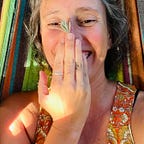The Blind Oracle
DOING THINGS WITH STORIES
And it’s online, my storied essay “The Blind Oracle,” along with other amazing stories. Check them out here. All these stories were selected for the Doing Things with Stories (DTwS) Global Participation Intensive, from ArtEZ University of the Arts, Oxfam, and Radboud University.
Doing Things with Stories (DTwS) is a collaboration between Radboud University, ArtEZ and Oxfam, focused on narrative change-making practices. DTwS is an invitation for passionate change-makers to collectively imagine a better future, by creating conditions of narrative change. Working with young learners in science and arts, and powered by a politics of hope, it is a global digital residency that creates meaningful interventions and approaches towards collective action.
From the editorial:
“The story can be a witness, a revelation, a provocation, an invitation, a reflection, a pause, a shield, a defence. The story does not have to carry the function of engaging with the crisis overtly or explicitly. Stories might need crises, but crises definitely need stories. It is important to realise that every known crisis is both produced by the stories that sustain and support it, and is understood by the stories that critique and resist it. In the current times that we live in — in this beginning of the third decade of the twenty-first century, we find ourselves in times of crises. Be it the planetary crisis of global warming and mass-extinction, a global pandemic, uncontrollable misinformation threatening the social and intimate fabrics of connections, or the ongoing threat of radical populist and anti-democratic political forces that have been gaining strength all over the Western hemisphere.”
An introduction from Alejandra Ibarra Chaoul:
“With a different hope-producing approach, Sofia focuses on vindication. Her narrative does not play around with a future that might be. Instead, the author dwells in how things could’ve — nay, should’ve — been. She relies on what her instinct finds troubling and uses that to identify misogyny, racism and fear in the narratives written by imperialist views. These imperialists’ views continue to be deemed unquestionable. They often signal out otherness and portray it as less or wrong. Sofia’s re-writing of the blind prophet Fatima is so evocative that it could easily have been a luscious painting bursting with color. The texture of green leaves, the protuberant tree roots poking out of the land and the fluid movement of mystical women is dreamlike. This idyllic imagined moment is only perturbed by a creeping man and his biases, which impede him from admiring the women in all their grandiosity and, instead, makes him fearful. This is almost a metaphor or our own times and holds such valuable lessons for all readers. Sofia’s narrative does justice to overlooked and misunderstood communities while inviting readers to be critical observers and open-minded narrators.”
The beginning of the story “The Blind Oracle”
“Fátwa, the elder tattooed Priestess, was tired; for over 50 years, she’d been a devoted apprentice and guardian of this landscape. The old black Priestess had been feeling tired lately, climbing the sacred path to the top, her wrinkly skinny feet scraping the rocks beneath as she walked the steep mountain. Of course, her feet knew the way, so she relied upon them to follow the whispers of the windy path, to find the way between the labyrinths of deep-rooted trees, through the cracks between the boulders, and passing the cold-water streams that write this sacred place, ever cyclical and alive, the geography of prophecy and dreams.”
